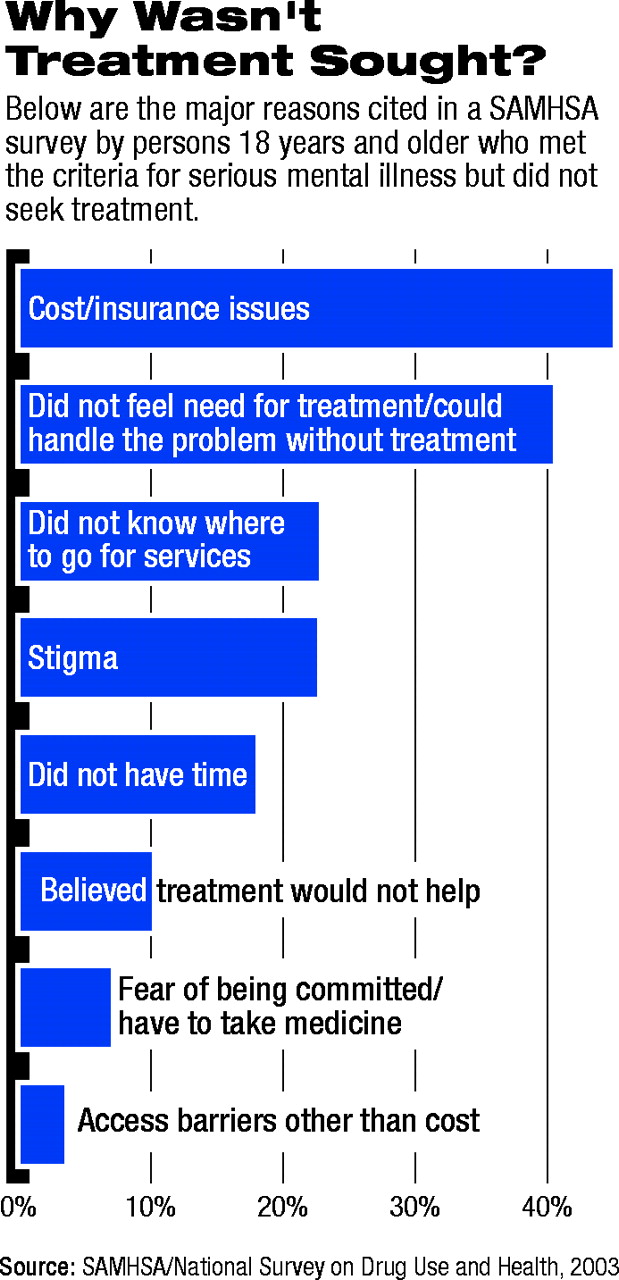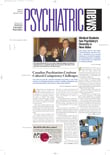Serious mental illness affects an estimated 19.6 million American adults, or about 9.2 percent of the population, according to data from the 2003 National Survey on Drug Use and Health (NSDUH).
The number of people with serious mental illness has risen significantly from 2002 NSDUH estimates (17.5 million), according to a report of the survey's findings by the Substance Abuse and Mental Health Services Administration. The results were extrapolated to U.S. population estimates.
The NSDUH is a national representative survey conducted among almost 70,000 people in their homes. It collects information on the prevalence of substance use in the population, perceptions of risks related to substance use, patterns of use, treatment, and mental illness (see
page 8).
The findings were released in September.
According to the NSDUH, an estimated 4.2 million adults met criteria for both serious mental illness and substance abuse or dependence during the previous year. Serious mental illness was defined as experiencing a diagnosable mental, behavioral, or emotional disorder that meets DSM-IV criteria and results in functional impairment that substantially interferes with or limits one or more major life activities.
For the purposes of the survey, substance abuse or dependence was distinguished as a separate category from serious mental illness.
The study found a strong link between serious mental illness and drug and alcohol problems.
Among adults with serious mental illness in 2003, 21.3 percent were also dependent on or abused drugs or alcohol. The rate among people without serious mental illness was just 7.9 percent.
About 21 percent of adults with substance abuse or dependence had a serious mental illness, according to the NSDUH. This rate dropped to 8 percent among adults without substance abuse or dependence.
The survey also measured the prevalence of mental health treatment in the United States, defined as “the receipt of treatment or counseling for any problem with emotions, `nerves,' or mental health” in an inpatient or outpatient setting in the year prior to the interview.
In 2003 an estimated 28 million adults, or about 13.2 percent of the population, received treatment for mental health problems. About 1.8 million adults were hospitalized for mental health problems, according to the survey.
When researchers analyzed demographic information for those who received treatment, they found the rates of treatments were highest for those reporting that they belonged to two or more ethnic groups (17.5 percent) or who were white (15.3 percent).
Ethnic Differences Found
African Americans had lower rates of mental health treatment (8.5 percent) than did whites; the same was true for Latinos (8 percent). Asian Americans had the lowest treatment rates (4.9 percent).
Among the 19.6 million adults with serious mental illness in the United States, 9.3 million, or 47.3 percent, received treatment.
As for the 5.9 million people with serious mental illness who perceived an unmet treatment need, cost or insurance issues were cited most often for not receiving professional help (see chart on page 6).
The survey also found that an estimated 21.6 million Americans had a substance dependence or abuse problem in 2003, representing about 9 percent of people aged 12 or older.
The majority were dependent on or abused alcohol (14.8 million), while 3.1 million were dependent on or abused both alcohol and drugs, and 3.8 million were dependent on or abused drugs alone.
Only about 3.3 million people aged 12 or older received some kind of treatment for a problem related to alcohol and/or drug use the previous year, the survey found, yet an estimated 20.3 million people needed such treatment but did not receive it.
Stigma, Costs Deter Many
Of the 20.3 million Americans who needed but did not receive treatment in 2003, only about 1 million said they felt they needed treatment for their alcohol and/or drug problem at the time of the survey.
Need was determined by virtue of meeting DSM criteria for substance abuse or dependence.
Of this latter group, 273,000 reported they had made an effort to get treatment but did not get it for various reasons.
The majority of those who said they made an effort to get treatment felt they were not ready to stop using the substance (41.2 percent), cited barriers related to high costs of treatment or problems with insurance (33.2 percent), said they were afraid of being stigmatized (19.6 percent), or reported that they believed that they could handle the problem without treatment (17.2 percent).
More information about the 2003 National Survey on Drug Use and Health is posted online at<www.oas.samhsa.gov/nhsda.htm#NHSDAinfo>.▪

